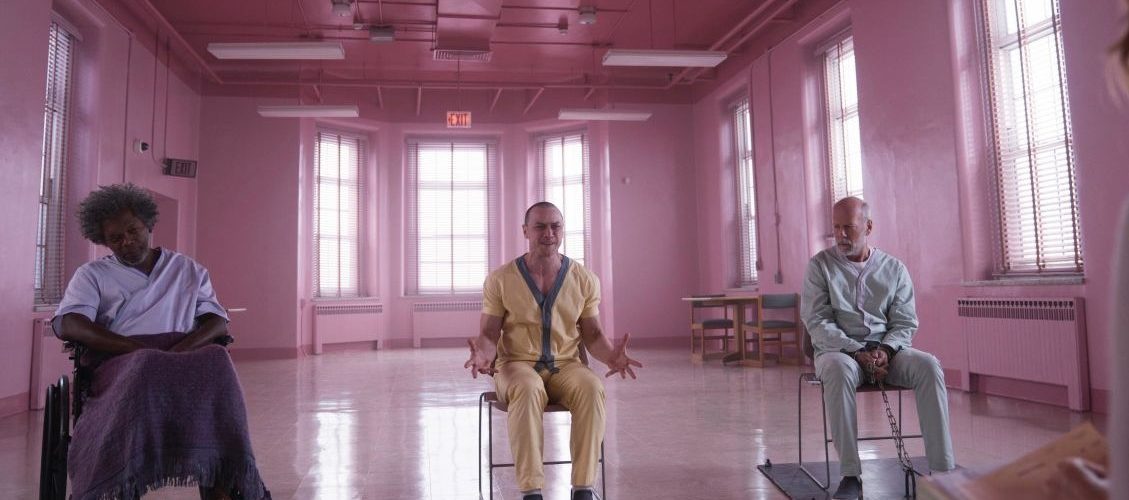In case of emergency break glass.
In 2000, M. Night Shyamalan released his fourth film hot on the heels of Sixth Sense, and it featured Bruce Willis yet again. Unbreakable had this duo on top form – but they left it there. Shyamalan kept rolling films but his reputation tumbled further each time, hitting rock bottom with The Happening in 2008. Fast forward to much excitement and anticipation as Bruce Willis pops up for several seconds at the end of Shyamalan’s 2016 film Split. That’s right, a trilogy was on the cards, Patton Oswalt got his dream sequel. Kind of.
Glass picks up a week or two after the end of Split, with James McAvoy’s DID suffering character on the loose, morphing into the Beast. Bruce Willis is David Dunn, the man who cannot be hurt, and he’s looking for the Beast as part of his undercover hero routine before both are captured and locked up in a mental asylum with Samuel L. Jackson’s criminally insane Elijah Glass.
I was pretty giddy at the end of Split. If you’ve ever heard me go off on a tangent about superhero films then, firstly, I’m truly sorry, but secondly, you’ll have heard me profess undying love for Unbreakable. I think it’s Shyamalan’s best film and probably in the top three superhero movies. But while Split felt like a slight steadying of form for Shyamalan, Glass tears it all back down again.
It shouldn’t be so surprising given that Shyamalan’s oeuvre contains far more duds than it does gems, but the promise was too much to resist. So what’s wrong with it? Well, it starts off decently as we see where David Dunn has landed, embracing his gifts – they even got Spencer Treat Clark back as his son, Joseph, to complete the look. But as soon as Dunn and Kevin Wendell Crumb (McAvoy) are captured, breaking up a tense, rain-soaked showdown, the film is lost.
Ponderous, empty scenes play out as the ever-bland Sarah Paulson plays a psychiatrist attempting to treat the “delusions” of the trio she’s so patiently waited to capture. There is none of the darkness with which you associate back to Shyamalan’s early films. Bright rooms, pointless extreme close-ups and even brighter, more sterile outdoor set-pieces make you think Shyamalan might have had bigger plans for this story than he could wrangle budget for (and in fairness, it probably took a bit of money to get Willis, Jackson and McAvoy in one movie).
‘What was so considered and well crafted about Unbreakable is undone here.’
I can’t talk more about the plot without giving it away, but it doesn’t go where you’d think it might, or where you’d want it to. What was so considered and well crafted about Unbreakable – the tentative friendship of Dunn and Glass, the slow realisation of his own power, the emotional strain of the Dunn family – is undone here. That film grounded the “hero”, making it mysterious and unnerving, but this films suffers from feeling like it has to compete with the very comic book movies it was trying to keep at bay. Previous Shyamalan efforts have also used colour well (the red objects in Sixth Sense for example), foreshadowing events or marking intentions, but here the colours and costumes come off as either cheap or indecipherable.
There are, however, some nice nods to the first film, most noticeably the comic book-store scenes, where various characters seek to make sense of what is happening, and Joseph’s collection of one-liners reeled off by bad guys his father is fighting for his “book” is a nice touch to subvert the genre. The number of unsubtle nods, however, bring the positives clattering down around you. For instance, Shyamalan inserts himself into this film for another cameo, as if he needed to reprise his own cameo from Unbreakable, while Anya Taylor-Joy (reprising her role from Split) is wearing a jacket from the zoo where she was held captive, seemingly for little more reason than to headbutt the viewer in the face when all it need was a wink.
Let’s talk about plot holes too. The guards in the psychiatric hospital never seem to hear any shouting, shrieking or slammed doors – at one point two of what must be only three patients on that wing have the door held open for them by the single security guard as they waltz out, barely disguised. Also, Elijah Glass claims he created Dunn when he caused the train wreck in Unbreakable, but was it not established that he’d always had his gifts, faking injury in a car crash so he could quit his college football career to be with his sweetheart? Never taking a sick day at work?
Essentially, nothing comes together here and Shyamalan should probably lay this to bed. Unbreakable should be left as a one-off to enjoy and treasure – forget the rest.
As a final thought, was 2012’s Moonrise Kingdom really the last good role Bruce Willis has had? His expensive appearance costs and the limited budgets of original films seems spell the end for anything positive in this respect – and he can be pretty damn good when he wants to be, it just isn’t that often.
